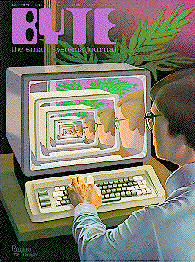About terminals from various vendors...
A major trend in the video-terminal business during the past decade has
been for companies to
merge, change names, and/or acquire lines of business from each other ,
so tracking the affiliation of some terminals can be difficult.
(The other significant trend has been toward using desktop computers that
emulate a dedicated terminal.)
As the Twentieth Century recedes into recollection, many computer users
who have recently joined the club are unaware of how many different
(and, alas, mostly incompatible) character-cell video terminals were
in wide use during a large part of the 1970's and 1980's. This
proposed 1989 update of the list of terminals in RFC 1091 may give a hint
of the variety that once thronged the marketplace, before the industry
became "assimilated."
Another snag that newcomers to computing hit: the expectation that
documentation must exist on the
Worldwide Web
for every piece of equipment that was ever made. For equipment sold after
1996, this expectation may be appropriate. However , for older gear,
you are likely to be disappointed.
Even into the 1980's, the user manuals for many video terminals
were actually written on electromechanical typewriters (e.g., IBM Selectric),
and no machine-readable original ever existed. If
some older documents are Web-accessible, it is because
some public-spirited person
has done the techno-historical grunt work of converting old documentation
to a form readable by a Web browser.
For glimpses of how computer hobbyists of the early 1980's used character-cell
video terminals with the home computers of the day, you can visit a library and
look up these
articles from BYTE magazine .
The page you are viewing provides information on video-terminal products by
a variety of vendors. For information that applies in general to all video
terminals, see the
general information page.
Other pages in this site provide access to specific information on terminals
sold by
DEC ,
IBM , and
Televideo .
Archival Information About Various Text Terminals: by vendor
from April 1979, shown here)
Amusing uses for dead Volker-Craig Terminals (2003 link)
Wang terminals
Wyse Technologies terminals (merged with Link)
"termcap" and "terminfo" data for Wyse terminals
Using Lynx with a Wyse terminal
The Stratus V103
looks suspiciously like a
Link MC-5 .
Tektronix Graphics Terminals
here ,
or perhaps a picture
is worth a thousand words.
Special-Purpose Terminals
A small amount of discussion of POS (point-of-sale) terminals is stored
here .
A number of resources are listed on
Hal Stiles's Point-of-Sale Page .
Neuro Logic Systems (i-Term 1U rackmount flat-screen
15-inch-LCD terminal;
Televideo, Inc., , (vendor of
TeleClient flat-panel thin client --PDF file)
Planar Systems Electroluminescent Flat Displays in this PDF file .)
Eason Technology, Inc. (industrial terminals and peripherals)
Computer Dyamics (formerly Lucas-Deeco), maker of
flat-screen industrial terminals, displays, and computers.
Axiom Technology (industrial workstations/flat displays)
EarthLCD (Earth Computer Technology) (surplus screens...
beware: some web browsers lock up viewing this page)
Applied Data Systems Inc. (flat-panel controllers)
PixelVision Technology, Inc. (flat-panel LCD monitors)
ViewSonic Corporation (vendor of flat-panel LCD screens...
note that viewing web site downloads hundreds of
graphical images Smartline B&V (Italian vendor of
the Terminale VGA Colore TK-635/29TE09 module,
ADDS 4000/260LFC Little Foot--compact footprint/POS terminal
Demex, Inc. (display screens for industrial assembly lines)
Heidenhain TNC (control machine tools)
Seetron (Scott Edwards Electronics--serial interface LCD screens)
Micro Electronics Corporation (LCD modules)
Compucat Communications Products (rugged, Tempest, mobile WS)
2-Line Mini-Terminal (Roger Schaefer)
L-3 Communications (aerospace-grade flat-screen displays)
Panasonic ToughBook Wireless Windows Display (Remote Desktop Protocol)
Teklogix, Inc. (RF/wireless terminals)
LXE, Inc. (RF/wireless terminals;
division of Electromagnetic Sciences, Inc.)
TTY FAQ
(teleprinter-compatible devices for hearing-impaired persons)
Gallaudet TTY-to-PC Information
JBliss Low-Vision Systems (PC-based imaging, etc.)
Beam Ltd. (XVI X terminals for the visually impaired)
BRLTTY (Braille display for Linux)
Alva Access Group (ABT: Alva Braille Terminal, serial interface)
Alis Technologies, Inc. (Arabic video terminal)
Key Tronic
ClienTerm (Citrix thin client in a keyboard)
Netvoyager Tarantella Thin Clients
ipcas GmBH Serial/Ethernet Converter products
Lantronix Universal Thin Servers (Ethernet/TCP/IP/Telnet to serial)
Links to Other Pages in this Collection
Links to Vendor Pages
Boundless Technologies
(a.k.a. SunRiver Data Systems or ADDS)
sells
MultiConsole Personal Terminals
Wyse Technology , vendor of general-purpose terminals,
offers some support resources, such as these:
(See also the
Wyse UK Web site
and the description of
the current WY-520ES product .)
And Hugo Villeneuve offers this
Wyse 520 Terminal tour .
Axel, Inc. introduced during 2003 the
AX3000/75E terminal ,
which supports the multiplatform
VNC X11-based remote graphics protocol, in addition to
MS-RDP and IBM 5250/3270.
Visara, Inc. (vendor of
Network Computing Terminal and Linux Thin-Client Desktops , also
under selling MTX and Memorex/Telex 3270/5250 products)
Hewlett Packard (700/60 and 700/70 Display Terminals: 2000 link)
VXL Instruments
(Wyse or IBM-compatible terminals & "Network Computers")
Data General
D1200i/D1600i
terminals (updated June 1997)
GraphOn (thin clients: NT/Unix/PC server, Java X server, Go-Global)
Alpha Micro AMOS Terminals (2002 link ...
AMOS data sheets )
Quest International (touchscreens, medical screens, CRT refurbishment)
What once was Tandem Computers, Inc. is now a subsidiary of
Hewlett-Packard ; it sold both
proprietary and
standards-compliant terminals.
Tektronix, Inc. does not admit to ever having made video terminals.
Neoware Systems, Inc. (used to be HDS, Human Designed Systems ),
"Capio" thin-client appliance product from
Boundless .
eSeSIX Business Group (of Pfaffenhofen) in 2005 sells the
ThinTune client package
C. Itoh scarcely remembers having ever made video terminals.
(UK site )
MyVu (a iPod-type approach to display screens)
White Pine's Software Connectivity division has now become
Powerlan-USA ,
WebTerm : a product for emulating a terminal session
within a Web Browser.)
Siemens-Nixdorf has split into
Wincor-Nixdorf
and
Fujitsu-Siemens
Core Technology Corporation (Unisys A, V terminal emulation)
Black Box Corporation (data communication product vendor)Optimum Technology Ltd. (PAL Teletext receiver)
The Zenith Data Systems website has disappeared.
Memorex.co.jp (Japanese)
EDS Global Field Services handles Memorex-Telex repairs.
Forvus Research (3270 host access solutions)
Crystal Point, Inc. (OutsideView/6530)
CAIL Systems, Ltd. (CTT/6530)
Unidata Inc. (Wintegrate, other products for
Pick )
UltraTec, Inc.
(vendor of TTY/TDD/special terminals...including an ASCII
"Pocket Size TTY")
NXi Communications, Inc. (TTY/TDD)
The Unofficial Wang VS Information Center (tjunker.com)
Falco Data Products has undergone some kind of transformation;
apparently queries are now being answered by
Pathlink Corporation .
Emulation Documentation on the Internet
There is now also a good description of the emulation of
Hewlett-Packard terminals as implemented in the WRQ Reflection
product, available from the
Walker-Richer-Quinn Support Page ; this
HP Terminal Reference Manual V8.0 Adobe Acrobat Reader to view it).
Links to dealer pages
Arcy Solutions (CA: refurbished Wyse products, also Qume, Link)
Vecmar (OH: ADDS, Link, Wyse, NCR, Tally, Unisys, IBM, Boundless)
Vecmar (OH: DEC VT220, VT330, VT420, VT510)
1st Solutions, Inc. (AZ: Qume, ADDS, Wyse, Link, Sherwood, Prime)
American Computer Exchange (NJ: Wyse, Link, ADDS)
EMI Solutions (Equipment Management, Inc.) (MA--Jungle Road)
Micro Technologies International (TX: ADDS, Wyse, Falco, Esprit, Link)
DataTrek Computers (ADDS, Wyse, Link, Televideo)
Quasar Systems, Inc. (TX: new and refurbished)
ComTech Systems, Inc. (NY: Stratus=Televideo|Boundless)
Vintage Computer Marketplace , with a regular schedule of regional
Vintage Computer Festivals
Recycled Goods (terminals, keyboards)Omni Systems Associates (NJ: DEC)
Commerce Computer Corporation (GA: IBM, Wyse)
PC Solutions/Heilman Systems (FL: used terminals)Newman Computer Systems (dealer in used DEC, Sun, and HP equipment)
Pacific Data Systems (CA: used equipment)
714 Used Printers (CA: also terminals)
Used Computer Equipment Dealers
MicroPricer Used Equipment (thin clients, terminals)
Electronics Exchange (Recycling, Reuse)
9 to 5 Computer (DEC)
The Used Computer Mall
Regal Technology (TX: Televideo/Stratus terminals)
Contemporary Computer Source (TX: Televideo/Stratus terminals)
Ebinger Equipment Company (NCR equipment)
In addition to the above commercial sources, used terminals
and related equipment are often available at amateur-radio
hamfests; see the ARRL's listing .
Information Source Web Pages
As of early A.D. 2001, Bryan Blackburn is making the vintage
user manual for the Lear-Siegler ADM-3 terminal available
on the Web, each page a GIF-encoded image. (Also the ASR-33 Teletype.)
Information and Links to Useful Communication and Accessory Products
Go to page on PC-based terminal emulation. Go to page on keyboards, mice, and other pointing devices. Go to page on setting up an operating system to use terminals. Links to tangentally relevant information. Links to x term information. Links to DEC terminal information (including VT100). Links to IBM terminal information (including 3270). (return to Video Terminal index page)
Introductory material and archive contents collection copyright © 1995‒2010 Richard S. Shufordmirror information ]

